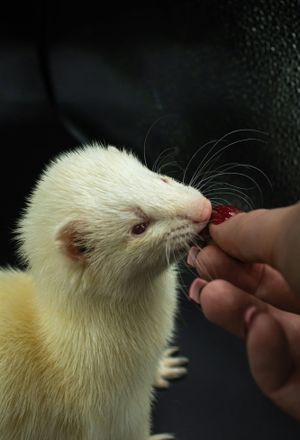
Diarrhea in ferrets is a very nonspecific condition and the causes are numerous. Inflammatory bowel disease is common in ferrets but in this species, it is used as a non-specific term, true IBD (autoimmune) is rare. Eosinophilic gastroenteritis can cause diarrhea and is characterized by enlarged mesenteric lymph nodes and increased eosinophils on a complete blood count. Epizootic catarrhal enteritis is caused by a coronavirus in ferrets and results in green mucoid diarrhea, birdseed consistency. This virus us often associated with new adding a new animal to the home. Other viruses may also be the cause of diarrhea including rotavirus and parvovirus (Aleutian disease). Helicobacter mustelae gastritis may cause ulcers, recent stress, black diarrhea, and anemia. Lawsonia spp. causes proliferative bowel disease in young ferrets who may develop rectal prolapse from the thickened colon. Parasitic infections also can present as diarrhea and rectal prolapse. Hepatobiliary diseases such as chronic cholangiohepatitis can also cause diarrhea. Campylobacter jejuni is a zoonotic bacterial infection that can be seen in young ferrets or those on raw diets. Raw diets can also cause coliform enteritis and Salmonellosis. Gastrointestinal lymphoma does occur in ferrets and can cause diarrhea. Lastly, diarrhea may be due to food sensitivities, dietary indiscretion, and gastrointestinal foreign bodies.
Symptoms include loose stool, mucoid stool, melena, green or bile-discolored stool, bloody stool, fecal staining or pasting around the anus, abdominal pain, decreased appetite, lethargy, weight loss, dehydration, unthrifty/failure to thrive, fever, rectal prolapse, tooth grinding or lip licking, enlarged abdominal lymph nodes, and thickened intestinal loops.
Diagnostic tests should begin with fecal parasite testing and Gram staining for bacteria. A complete blood count and blood chemistries to look for evidence of nonspecific bowel inflammation and other metabolic issues. Advanced diagnostics include fecal culture, specific testing for listed etiologies, bowel biopsy and histopathology.
Fluid support is important as many ferrets will come into the hospital very dehydrated. Nutritional support with assist feeding is also very important. Antibiotics specific to the disease involved may be is used and any other treatments specific to the underlying cause. Dietary correction or a novel or hydrolyzed protein diet may be helpful.
Prognosis depends on etiology, many are self-limiting but require supportive care, but others are chronic and require lifelong management. Certain chronic diseases such as IBD and lymphoma may be sequelae of other diarrheal conditions.
A recheck examination is recommended at the end of treatment to make sure problems have been resolved. Severely dehydrated or debilitated animals may require hospitalization with IV fluids.
Copyright © All Rights Reserved
